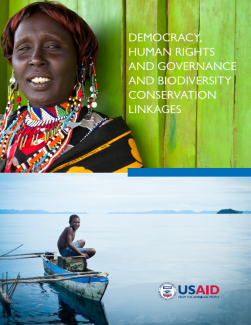Governance describes the process by which decisions are made and carried out; it can refer to corporate, international, national or local bodies, or interactions between sectors of society. Governance comprises such critical development elements as the rule of law, public-sector accountability, communication with citizens, anti-corruption measures and the ability to deliver goods and services.
There are strong linkages between good governance and biodiversity conservation. Better governance, conservation and natural resource management all focus on improving the collective good. Similarly, good governance and biodiversity conservation require the participation of local communities in decision making and management. Where governance institutions are seen as legitimate, transparent and effective, people are much more likely to follow the rules and regulations that the institutions set. Further, combining collective action, natural resource management and good governance can provide incentives to individuals and groups to manage natural resources in more sustainable ways. Good governance is thus a linchpin of biodiversity conservation.
USAID democracy, human rights and governance (DRG) staff place primary importance on democratic values and citizen centered governance. But many living in historically authoritarian countries face limited freedoms and therefore a restricted space for independent civil society. At the same time, those dependent on natural resources in these countries, living in poverty and food insecurity, are gripped by their situation and the concern for democracy can seem secondary at best. In this context, USAID seeks to motivate and support democratization that is in many ways entwined with improving livelihoods.
Natural resource management and conservation are good entry points for strengthening governance and civil society because they focus on issues and concerns central to the livelihoods and well being of a large part of the population in many countries where we work. Today, at least 1.6 billion people worldwide rely on forests for some part of their livelihood, and about 2.6 billion people in developing countries depend on fish for protein and/or income. The poor management of both forests and fisheries means that these resources will not meet human demand over the long term—compromising global food security and straining the resilience of these systems and society. Unbridled exploitation is also leading to unprecedented rates of species extinction. These trends threaten the ability of families to lift themselves out of extreme poverty and communities to protect against economic or environmental shocks. Natural resource management also offers the opportunity to bring together multiple stakeholders to foster open and accountable participation and help avoid potential violent conflict. Clearer policies and bylaws governing natural resources can reduce over exploitation by clarifying management, ownership, use and benefits.

